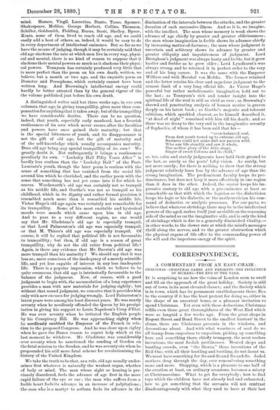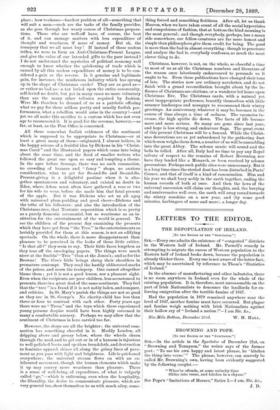CORRESPONDEN CE.
A COMMENTARY FROM AN EASY-CHAIR :
CHRISTMAS-CHRISTMAS CARDS AND PRESENTS-THE INFLUENCE OF DICKENS-THE END OF THE YEAR.
IT is surprising to see how the veins of London seem to swell and fill on the approach of the great holiday. Society is still out of town in its most elevated classes ; and the Society which is in town, which has its permanent establishments there, flies to the country if it has the least pretext for doing so, either in the shape of an ancestral home, or a pleasant invitation to spend Christmas. Yet even with these deductions, Christmas refills even those great thoroughfares of the West End which were so languid a few weeks ago. From the great shops in Regent Street and Bond Street to the smallest huxters' in the slums, there are Christmas presents in the windows, and decorations about. And with what weariness of soul do we all tramp from emporium to emporium, picking up something here and something there, chiefly trumpery, the most useless inventions, the most foolish prettinesses. Heated shops and bustling crowds, even "the Stores," those inventions of the Evil One, with all their hustling and bustling, do not daunt us. We must have something for So-and-So and So-and-So. Jaded mothers drag through the day, ever remembering something more and more. Shopping, which is a pleasure to one half of the creation at least, on ordinary occasions, becomes a misery at Christmas-time. What to get for everybody ; how to find toys which the children have not already had and exhausted ; how to get something that the servants will not contrast disadvantageously with what they used to have at their last
place ; how to choose—hardest problem of all—something that will suit a man,—such are the tasks of the family provider, as she goes through her weary course of Christmas prepara- tions. Those who are well-off have, of course, the best of it, and can manage matters with less expenditure of thought and weariness, if more of money. But oh, the trumpery that we all must buy ! If instead of those useless trifles, we were to form an Anti-Christmas-Present League, and give the value of our intended gifts to the poor instead P I do not understand the mysteries of political economy well enough to know whether the quickening of trade which is caused by all this useless expenditure of money is to be con- sidered a gain or the reverse. Is it genuine and legitimate gain, for instance, the mushroom industry which has sprung up in the shape of Christmas cards? They are as good as— or rather as bad as—a tax levied upon the entire community, self-levied no doubt, but yet in many cases no more voluntary than are the many other tributes required by fashion. Were Mr. Goschen to demand of us as a patriotic offering what we pay for these seldom pretty and usually foolish per- formances, what a rebellion would arise in the country !—and yet we all make this sacrifice to a custom which has not even age to recommend it. It is good for the revenue, however,—so far, at least, as the Post Office is concerned.
All these somewhat foolish evidences of the sentiment which is supposed to be appropriate to Christmas—or at least a great many of them—originated, I almost believe, in the happy seizure of a fruitful idea by Dickens in his " Christ- mas Carol " and the illustrated papers which came into being about the same time, and the flood of smaller writers who followed the great one upon so easy and tempting a theme. In the ages before Scrooge, there was no such commotion, no crowding of bazaars and " fancy " shops, no anxious consideration, what to get for So-and-So and So-and-So. Present-giving is a delightful pastime when it is alto- gether spontaneous and voluntary, and existed no doubt in Eden, where Adam must often have gathered a rose or two for his wife to wear, before she made him that fatal present of the apple. But it was Dickens who set us all agog with universal plum-pudding and good cheer—Dickens and the tribe of his followers : and also the introduction of the Christmas-tree, that Teutonic superstition which is so pretty as a purely domestic ceremonial, but so wearisome as an in- stitution for the entertainment of the world in general. To see the children of the present day examining the presents which they have got from " the Tree," in the entertainments so lavishly provided for them at this season, is not an edifying spectacle. On the whole, there is more disappointment than pleasure to be perceived in the looks of these little critics. " Is that all ?" they seem to say. Their little faces lengthen as they tear off the enveloping papers. The things were much nicer at the Smiths' " Tree " than at the Jones's ; and as for the Browns ! The biases little beings shrug their shoulders in premature contempt. They read the hastily obliterated marks of the prices, and scorn the trumpery. One cannot altogether blame them ; yet it is not a good lesson, nor a pleasant sight. Even when the recipients are poor children, less accustomed to presents, there is a great deal of the same sentiment. They feel that the " tree " is a fraud if it is not nobly laden, and compare, and criticise. In St. Mary's parish the things are not so good as they are in St. George's. No charity-child has less than three or four to contrast with each other. Forty years ago there were no " Trees," and the toys which these experienced young persons despise would have been highly esteemed in many a comfortable nursery. Perhaps we may allow that the sentiment of Christmas is here carried too far.
However, the shops are all the brighter; the universal com- motion has something cheerful in it. Muddy London, all dripping above and greasy below, where the wheels churn through the mud, and to get out or in of a hansom is injurious to well-polished boots and spotless broadcloth, and destruction to feminine apparel, shines all along the grimy lines of pave- inent as you pass with light and brightness. Life is quickened everywhere ; the universal stream flows on with an ex- hilarated movement, though the human elements which make it up may convey more weariness than pleasure. There is a sense of well-being, of expenditure, of what is vulgarly called " go,"—which is enlivening, even when the hospitality, the liberality, the desire to communicate pleasure, which are very general too, show themselves to us with much alloy, some-
thing forced and something fictitious. After all, let us thank Heaven, when we have taken count of all the social hypocrisies and compulsions of fashion, that at bottom the kind meaning is the most general ; and though everybody, perhaps, has a mean side somewhere, our fellow-creatures are far more honest and simple than philosophers give them credit for being. The good is more than the bad in almost everything : though to penetrate and analyse the bad is, everybody confesses, so much the most clever thing to do.
Christmas, however, is not, on the whole, so cheerful a time to most of us as all the Christmas numbers and literature of the season once laboriously endeavoured to persuade us it ought to be. Even those publications have changed their tone of late. The stories now are ordinary novelettes, and do not finish with a grand reconciliation brought about by the in- fluence of Christmas asscciations, or a wanderer led home upon Christmas Eve. The Christmas cards, with a natural yet most inappropriate preference, beautify themselves with little summer landscapes and nosegays to recommend their wintry greetings. An anniversary, whatever it may be, becomes in the course of time always a time of sadness. The vacancies in- crease, the high spirits die down. The facts of life become more and more serious. So many are gone since last year,. and hope is less strong, and endeavour flags. The great event of this present Christmas will be a funeral. While the Christ- mas decorations are as yet unburdened by the gathering dust which soon weighs them down, a number of us will be assembling into the great Abbey. The solemn music will sound and the bells be tolled. After all, Italy had no time to pay any Royal tribute of respect to the remains of Robert Browning, nor have they landed like a Monarch, or been received by solemn processions. Perhaps such public rites were unnecessary. But it is a long time since the storied dust has been disturbed in Poets' Corner, and that of itself is a kind of canonisation. Him and his year we shall bury nobly in the earth together, ending the human records of both at once. And then the laws of the universal succession will claim our thoughts, and, the burying and anniversaries well over, the earth will sway round towards the wintry sunshine on a new year, and (by some good minutes, harbingers of more and more), a longer day.



































 Previous page
Previous page